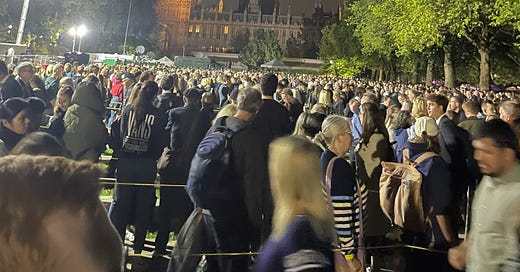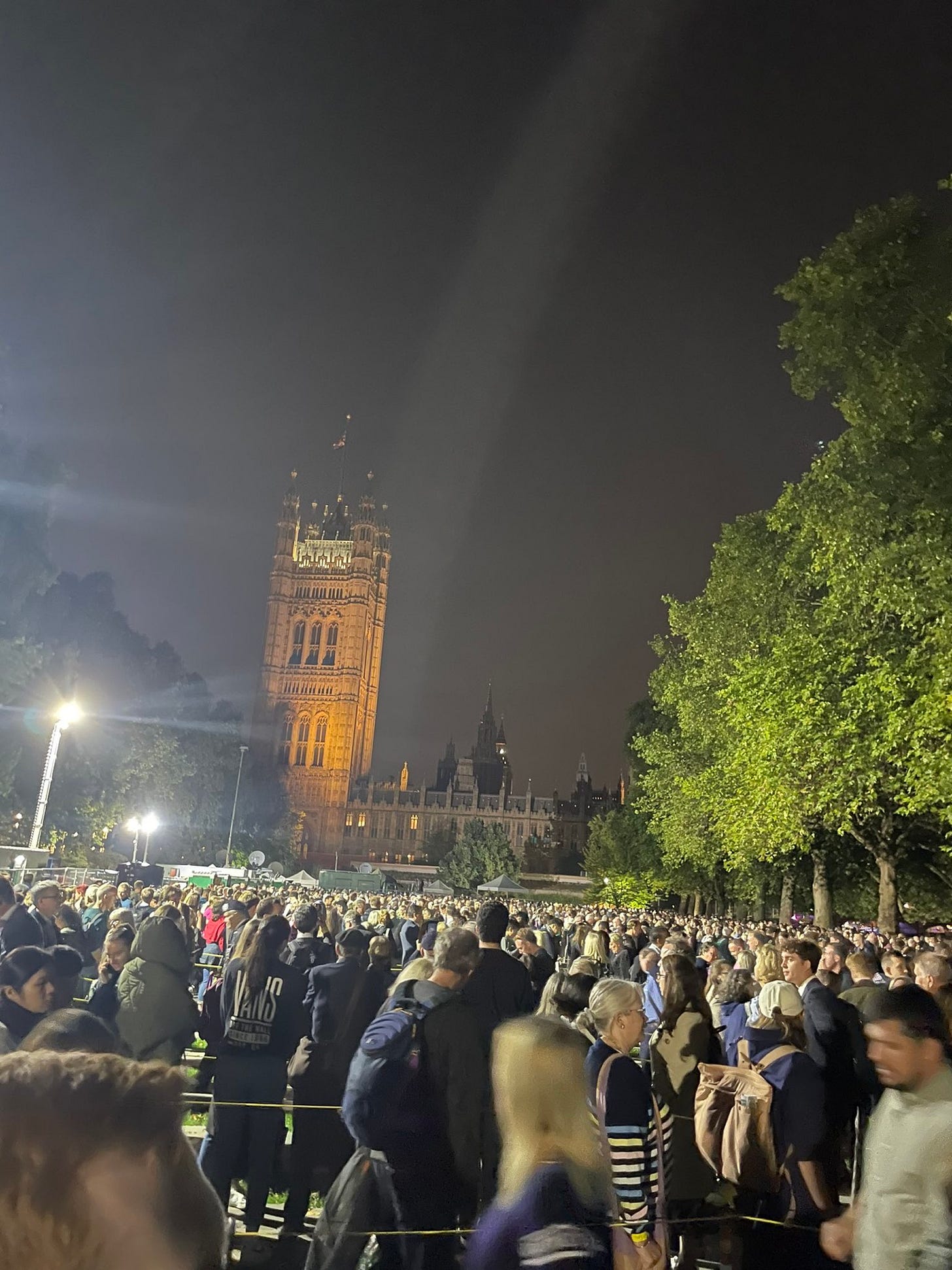16 September 2022. Royalty | Futures
The Queen, the mirror, and the mythology // Asking the public about the future of research
Welcome to Just Two Things, which I try to publish daily, three days a week. Some links may also appear on my blog from time to time. Links to the main articles are in cross-heads as well as the story. A reminder that if you don’t see Just Two Things in your inbox, it might have been routed to your spam filter. Comments are open. And—have a good weekend.
1: The Queen, the mirror and the mythology
There’s an interesting post on the death of the Queen at Novara Media by Rachel Connolly, a Catholic brought up in Belfast. It’s a reflective piece, but it points out that everyone’s idea of the Queen and the Royal Family is different. Here’s a couple of extracts:
There was a boy at my school in Belfast who used to sing a Protestant song on St Patrick’s Day every year. I don’t remember all the lines, but the chorus went something like: “You can celebrate St Patrick’s Day, you can dye the river green, but when the day is over you’re still governed by the Queen.” I don’t remember this song because it was unusual or transgressive – it was just catchy... I don’t think you can blame teenagers in that context for doing things that are stupid or a bit offensive – for not knowing any better, essentially.
From her perspective, the Royal Family was deeply associated with Unionism and Protestantism, in all of its forms. Her description of some of these is quite the list—from red, white, and blue kerbstones to a friend with ‘Snow Surrender’ Christmas decorations And that’s her point. Everyone’s Royal Family is different:
The royal family means what it means to me. In England, however, it seems to be associated with the English class system (I mean this to be value-neutral; some people view this as a positive, some as a negative); Britain’s imperial past (as before); tea towels bearing the union jack and ‘Keep Calm And Carry On’; the crockery collections of older relatives; Buckingham Palace; poppies;... To an American, it might mean tea and scones and words like “guvnor” – or maybe that’s just what an American thinking about England means to me.
It’s a form of mythology, in other words, and mythology is a part of nation-building. But it works because it includes some people and excludes others.
On which note, for those of us old enough to remember the war in the north of Ireland, the short clip on Twitter of Michelle O’Neill of Sinn Fein, Northern Ireland’s First Minister, talking to King Charles on his visit there this week is electric.

The veteran Scottish writer Neal Ascherson picked up on some of the ideas of the mythology of the Royal Family in an article in The Atlantic. We can more or less take it as a given that the only interesting writing on this comes from outside of England:
Elizabeth II’s life and reign had formed a sort of weatherproof awning, sheltering a long carpet of years. This carpet of continuity led all the way back to the Second World War, to the foundation myth of modern Britain, when “we stood alone” against fascism. Now that carpet is being rolled up.
(Photo by Anoushka Alexander-Rose from Twitter. Her copyright.)
Of course, you can’t go a long way in this discussion without bumping into the Scottish theorist Tom Nairn, who wrote about the myth-making around the monarchy, when such things were unfashionable, in his book The Enchanted Glass. Ascherson alludes to Nairn’s work:
As the Scottish philosopher Tom Nairn has written, she has been an “enchanted glass,” a mirror in which her subjects see themselves reflected as united, brave, and kindly, loved and respected by the giant spread of the outside world that was once the empire and is now the Commonwealth... That enchanted glass has turned out to be a distorting mirror. But the Queen projected a calm assurance that nothing had really changed, that Britain was still the same world-leading, stable old country that had emerged after the defeat of Hitler. This soothing story has kept her people comforting themselves in that false reflection.
That mirror seems to have been reassuring to the English, but less so to others, even others in the United Kingdom. Ascherson makes the subtle point that as the Queen got older, although she tried to “preserve the mysteries of the Crown”, people’s affection seems to have attached to her as a person:
Dangerous! The mirror of monarchy then loses its enchantment. If the symbols of the sovereign matter less than the mortal who wears them, Charles III will reign unprotected except by his own merits.
Of course, we can’t know yet, either way, but it is at least a possibility. It’s possible that the queues of mourners snaking alongside the Thames are there for the person and not for the institution. (On The Queue, by the way, Robert Rea’s twitter thread is charming). If I were a royalist, or indeed a republican, I might not rush to conclusions about the institution of monarchy just yet. As Peter Drucker reminded us, big surprises, such as the scale of the public grief at the Queen’s death, are often a sign that our mental models of how the world works is running out of steam. Things that are unexpected always come with ambiguities.

2: Asking the public about the future of research
'Creating the Future’ is an Irish project that set out to ask people what researchers in Ireland should be looking at. This was a large scale national conversation which ran from July to November last year. Yes, you could submit ideas online, but Creating the Future also went on the road, visiting towns and villages:
Researchers, policymakers, students and ambassadors exchanged ideas with people in town squares, community-centres and schools about the role that research can play in creating a more sustainable and equitable future.
They received more than 18,000 submissions, from all ages and from across the country and its communities. Linda Hogan, who chaired the project’s Expert Committee, notes that while some submissions were about ideas for research, more were about people’s “enduring concerns, their unmet needs, their priorities for the near and long term, their hopes for the future”.
Hogan observes that they
reveal a desire for a holistic not a technocratic future, a future founded on the values of inclusion, social justice, and environmental sustainability... with a significant number of submissions highlighting the urgent need for research-informed policymaking across all sectors of society.
The project’s Expert Committee, helped by 70 volunteers, went through the thousands of submissions and identified themes—16 of them, eventually. I’m going to share the whole list, because it’s not often that we get snapshots of these kinds of future-facing national conversations:
(1) A human-centric approach to health and social care
(2) Reimagining learning and development across the life course
(3) Advancing solutions for housing
(4) Safeguarding public interest and trust in the digital world
(5) Improving policymaking and the political system
(6) Promoting equality, diversity and inclusion in Ireland
(7) Fostering regional strengths
(8) Valuing and connecting communities
(9) Embedding climate action across society
(10) Supporting innovation in farming and food
(11) Future-proofing energy and water systems
(12) Connecting Ireland through green transport systems
(13) Nurturing humanities, culture and the arts
(14) Harnessing the benefits of fundamental research
(15) Building resilience and preparedness with insights from the pandemic
(16) Strengthening the research landscape and public engagement
You can search the ideas, and even filter them, at a page on the project’s website.
In the final report, for each of the 16 themes there is a detailed account from the public submissions, together with ‘nuggets of insight’ from the public, expert commentary and calls to action.
The research seems to have had some impact already:
Creating Our Future provides a unique reservoir of ideas to inspire future researchers and policymakers, catalyse new research areas, and encourage new forms of collaboration. The findings were submitted to Government and have already influenced national policy, through Impact 2030, and informed new research funding programmes, such as the National Challenge Fund.
One of the findings from the various deliberative projects that have been done with citizens in different parts of the world—of which this is a version—is that people are usually ahead of their politicians.That opens up a question for me about why politicians don’t move faster. But that’s probably one for next week.
——————————-
j2t#369
If you are enjoying Just Two Things, please do send it on to a friend or colleague.




